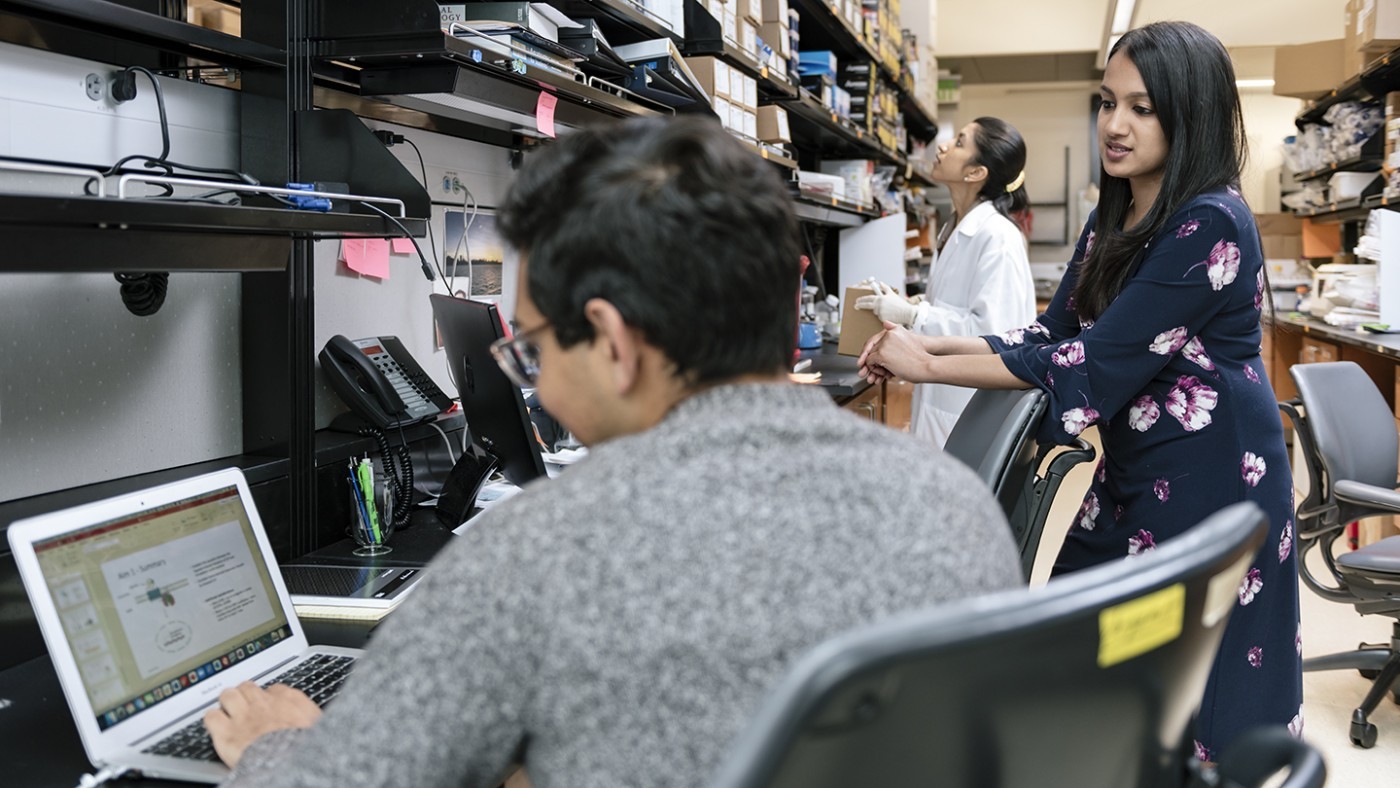Gladstone NOW: The Campaign Join Us on the Journey✕

Isha Jain has received two awards that will support her groundbreaking work.
The Searle Scholars Program has named Isha Jain, PhD, as one of their 2021 Scholars. She is also the recent recipient of a prestigious Klingenstein-Simons Fellowship Award in Neuroscience. Together, the recognitions provide $525,000 to support groundbreaking work at Jain’s lab.
“My research broadly addresses how humans interact with our environment,” says Jain, who joined Gladstone Institutes as an assistant investigator in 2021. “The funds will enable us to explore how these interactions could inspire creative new treatments for a wide range of disorders.”
Revisiting Vitamins as Therapeutics
Every year, the Searle Scholars Program grants 15 early-career scientists with $300,000 each to conduct pioneering biomedical or chemistry research over 3 years. For Jain, the grant will fund a novel investigation into the potential for vitamins to treat disease.
Conventional wisdom holds that we should all “take our daily vitamins.” These small molecules found in food and supplements are essential for the myriad biochemical processes that keep us alive. However, there has never been a systematic exploration of which specific diseases could be treated by taking higher or lower dosages of certain vitamins.
“A lot of the classical vitamin research was performed in the early 1900s, and then it sort of fell out of fashion,” Jain says. “Today, we have tools that didn’t exist back then, so it’s a perfect time to ask new questions.”
Jain and her team have already started applying systems biology and computational biology strategies to compile a set of diseases that could potentially be treated by fine-tuning vitamin intake. These disorders may span many categories, including neurodegenerative and cardiovascular diseases.
Next, they will test candidate vitamin treatments in animal models of disease. And because the safety of vitamins is already well-established, any promising treatments could likely be tested in humans relatively quickly.

Isha Jain and her team study a variety of diseases, including neurodegenerative and cardiovascular diseases.
The team is also creating novel biochemical tools to monitor vitamin levels inside cells, and they are conducting experiments in mice to gain a more detailed understanding of how the body absorbs vitamins and transports them to different tissues.
“I’ve been wanting to work on this project for a while, and we’ve dabbled, but we needed funds to really help us kickstart it,” Jain says. “As a Searle Scholar, I’m excited to move forward at a much faster pace and in new directions.”
Linking Cellular Energy Production to Neurodegeneration
Exploring how the balance of vitamins in the body affects disease parallels Jain’s other research into how energy production in the cells can affect the body. In fact, her earlier work inspired a new project that will be supported over the next 3 years by the $225,000 Klingenstein-Simons award.
Jain’s team is interested in studying whether mitochondria—structures within human cells that are responsible for energy production—may be relevant for common neurodegenerative disorders and the aging process.
The Klingenstein-Simons Fellowship Award in Neuroscience is awarded annually to early-career researchers who are working to understand the basic mechanisms of disease. Such work may not immediately affect clinical care, but could ultimately lead to major advances.
“These types of high-risk, high-reward grant programs are key for supporting unorthodox science that could have tremendous impact on human disease,” says Gladstone President Deepak Srivastava, MD. “We are so lucky to benefit from Isha’s unique and promising perspective.”
Jain says that both the vitamin project and the neurodegeneration project sit in her “sweet spot” of research that has a very clear biomedical impact, while also providing the chance to solve an interesting puzzle.
“I’m fascinated by the opportunity to expand beyond traditional drug-screening platforms and explore the way we live, eat, and breathe as a target for treating disorders,” she says.
Featured Experts
Support Discovery Science
Your gift to Gladstone will allow our researchers to pursue high-quality science, focus on disease, and train the next generation of scientific thought leaders.
CIRM Awards $7.5 Million in Discovery Grants to Gladstone Investigators
CIRM Awards $7.5 Million in Discovery Grants to Gladstone Investigators
Two ambitious research projects led by Gladstone investigators are boosted by funds from the California Institute for Regenerative Medicine.
Grants News Release Congenital Heart Disease Cardiovascular Disease Bruneau Lab Conklin Lab CRISPR/Gene Editing Human Genetics Regenerative MedicineKarin Pelka Wins Grant to Advance Immunotherapy for Colorectal Cancer
Karin Pelka Wins Grant to Advance Immunotherapy for Colorectal Cancer
The Colorectal Cancer Alliance has awarded Pelka a $500,000 grant to develop novel immunotherapies that overcome the most common form of colorectal cancer.
Grants News Release Cancer Pelka Lab2025 Searle Scholar Andrew Yang to Expand Inquiry into Blood-Brain Barrier
2025 Searle Scholar Andrew Yang to Expand Inquiry into Blood-Brain Barrier
The Gladstone scientist has received a prize to study how molecules cross the blood-brain barrier and influence brain health.
Grants News Release Neurological Disease Yang Lab




